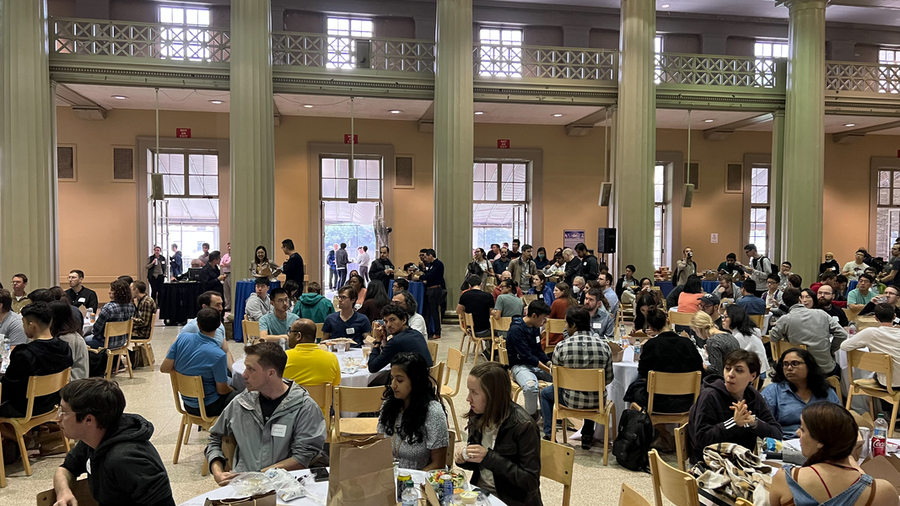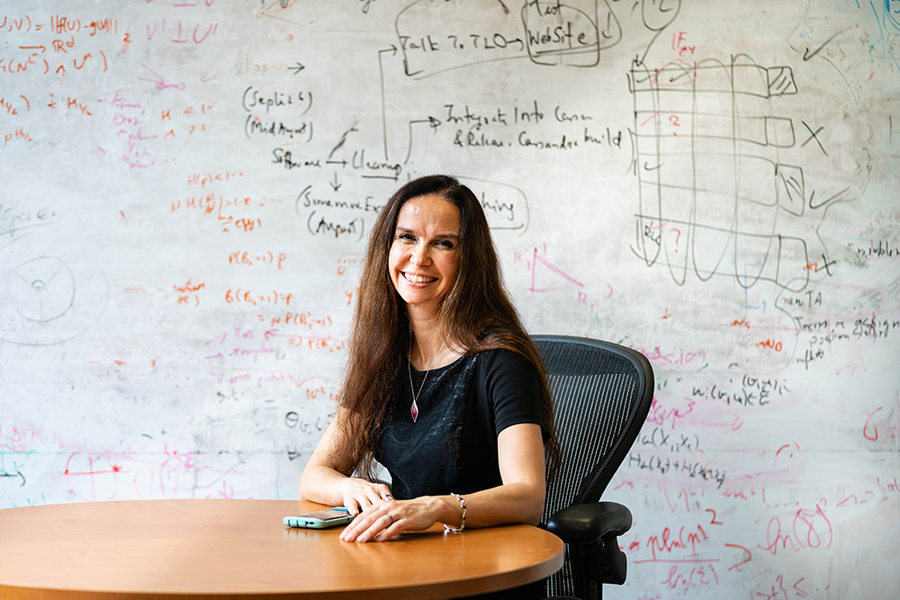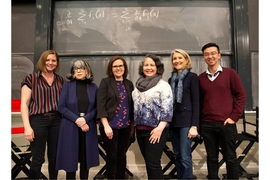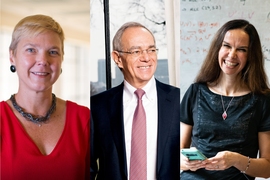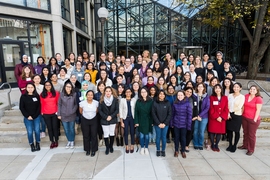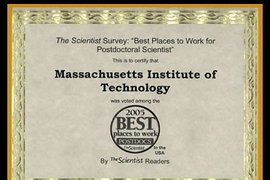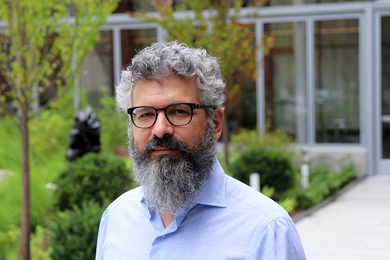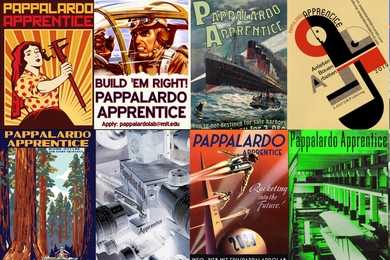Laura Maiorino arrived in Cambridge in late 2019, one of more than 1,400 postdoctoral scholars from around the world who join MIT each year to launch their careers in the company of other outstanding researchers. Within months, of course, the pandemic struck: labmates were working in shifts and taking meetings over Zoom.
“Even connecting within your research group was hard, and trying to find a network and community beyond your group was almost impossible,” Maiorino says. For many, the MIT Postdoctoral Association (PDA) has been a lifeline, organizing small community events and fostering a sense of belonging.
So when the Office of the Vice President for Research (VPR) hosted a luncheon this fall in recognition of National Postdoc Appreciation Week, it was perhaps the first time in three years that so many MIT postdocs had actually gathered in one place. With the patio doors thrown open at Morss Hall, the Walker Memorial ballroom, more than 500 postdocs met at last. A tradition at MIT, this year’s appreciation lunch on Sept. 19 marked 20 years of advocacy by postdocs at the national level.
In remarks delivered alongside deans and dozens of faculty, Vice President for Research Maria Zuber praised postdocs’ contributions to the MIT community. “Key research discoveries in the sciences, engineering, humanities, and business would not happen without the hard work and ingenuity of postdocs,” she said. “We’re grateful for the skills, creativity, and determination that you bring to your research and to MIT.”
The MIT PDA’s organizing in recent years has led to the creation of the Postdoc Initiative Grants and the Buddy Program, which was celebrated with an MIT Infinite Mile Award this year.
With Zuber’s full support, PDA leaders also developed an award program to honor faculty who model outstanding mentoring of MIT postdocs. As outgoing vice president of the PDA, Maiorino joined with new PDA President Ben Borer at the luncheon to announce the inaugural recipient of the Excellence in Postdoctoral Mentoring Award: Muriel Médard.
The NEC Professor of Software Science and Engineering in the Department of Electrical Engineering and Computer Science (EECS), Médard was nominated by current and former postdocs whose careers at MIT and beyond have been sustained by her attentive guidance. Whether supporting postdocs’ individual research goals by fostering new collaborations, or arranging mock interviews for those entering the job market, she was committed to seeing them thrive, nominators say.
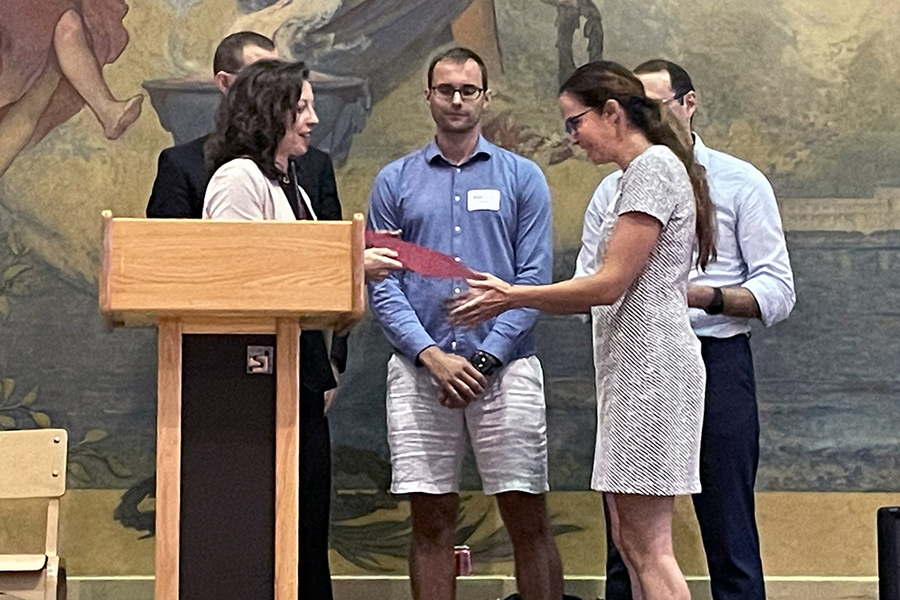
“The idea [of the award] was to find a way to celebrate the role of postdocs and recognize that they’re poised to become the next wave of leaders in their fields,” says Maiorino, who is engaged in immuno-engineering research at the Koch Institute for Integrative Cancer Research. “Faculty really have the ability to make or break a career. That has an immediate impact on the postdoc, because it enables them to become independent, pursue their career path, and find their next job, but it’s also an opportunity to model what good mentorship is.”
The alternative, she says, is bleak. “Having a poor mentor has two outcomes — people become disengaged and move away from whatever path they were on, or they become terrible mentors when their time comes. That’s a cycle we would like to break.”
As it turned out, the nominations poured in.
“We had many faculty, more than 30, who were nominated with wonderful letters from current and previous postdocs, and ideally you’d want to highlight all of them,” says Christopher Kinsley, a postdoc affiliate and former treasurer of the PDA, who is now based at the University of California at Berkeley. “It was overwhelming. These were letters that had clearly taken a lot of time to put together, with anecdotes about what a big difference mentors had made to their time as a postdoc and beyond.”
The nominations were reviewed by the PDA, working closely with Ann Skoczenski, director of postdoctoral services in the Office of the VPR, and by the Faculty Postdoc Advisory Committee.
“It was lovely, the response that we had,” Kinsley says. “We sometimes don’t think to stop and reflect — we can get so busy — and thank the people who’ve helped us to get somewhere. It gives you a chance to do that.”
Common themes were evident in the letters. Great mentors listened and set clear expectations. They used their networks to open doors for others. They created an inclusive environment where members of the research group all felt empowered to speak up. They acknowledged the stress of pursuing a research career and made room for trainees’ personal lives. They made time for technical discussions, but also encouraged a big-picture view of where the field was headed, fostering independent thinking.
“That’s the most important professional skill for the postdoc to develop in this phase — the ability to develop and execute an independent research plan,” Maiorino says. “If you are known as a good mentor, people will be more willing to join your lab and seek you out.”
The recipient of the annual Excellence in Postdoctoral Mentoring Award receives funds for a celebratory lunch with their research group and is invited to deliver a seminar for the MIT postdoctoral community on the topic of mentoring.
“The main aspect of good mentoring, in my opinion, is not necessarily to provide nuggets of wisdom,” Médard comments, “but mostly to try to support mentees in what they wish to achieve, which may be quite different from one to another. The best outcome of a good mentoring relationship is if your mentee seems then called to be a mentor. Does a postdoc become a manager or professor who is supportive of the people in their group? Was the experience with a mentee a limited interaction, or did it help engender a new strand of positive interactions between that mentee and others? If the latter, then the mentoring was successful.”
Médard was previously recognized with the 2013 MIT EECS Graduate Student Association Mentor Award, the first year that award was given. More than 25 postdocs, over 40 master students, and over 20 doctoral students have benefited from her guidance and leadership.
The nomination period for the Excellence in Postdoctoral Mentoring Award will reopen in early 2023, with the recipient to be announced during next year’s Postdoc Appreciation Week.
